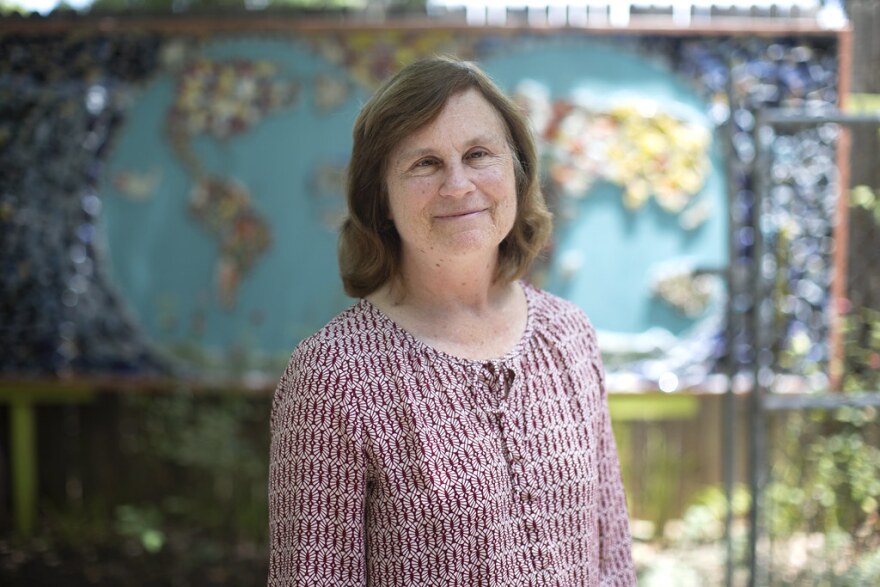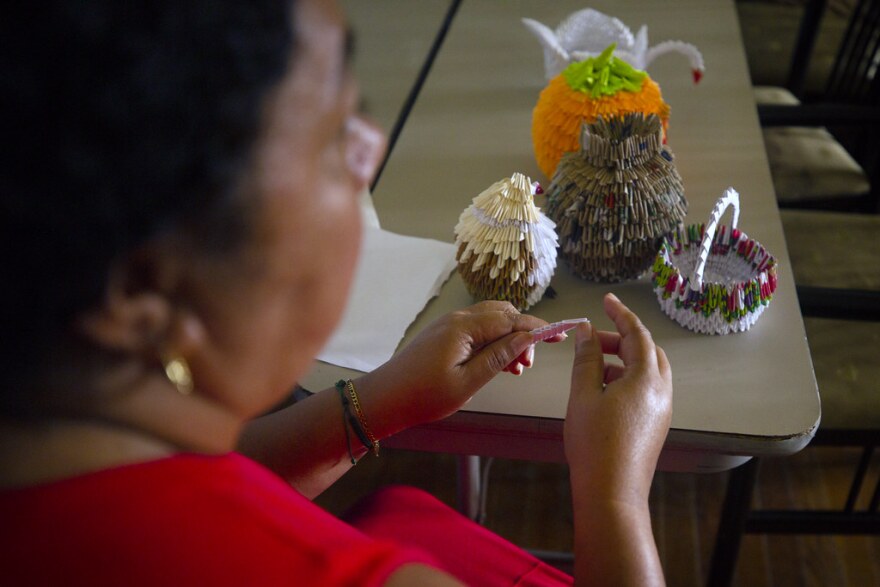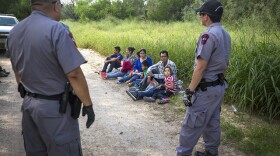For many people seeking asylum or citizenship in the U.S., getting here is just the start. Then there’s often the long legal work that needs to be done to stay in the country. For some families, there’s also the need for shelter.
Casa Marianella is a temporary safe house for migrants and refugees seeking asylum. The main house – there are 11 – is on a quiet, tree-lined block in a colorful residential neighborhood in East Austin. Across the street, two other buildings house a benefits clinic, a law office, a free acupuncture clinic and more beds for new residents.

“There are people cooking wonderful cuisines from around the world, people are outside having picnics, the children are playing,” says Jennifer Long, the shelter's executive director. “It’s like a little village.”
Casa, which opened its doors in 1986, receives a large portion of its funding from the City of Austin. Since last year, Long says, Casa hasn’t had enough beds to keep up with demand. In July, 85 people – including young kids – were living in a space designed for 38 people. Although that number is now around 40, overcrowding continues to force people to sleep on mats on the floor.
“We're just doing the best we can to keep them from being out on the street until we can find the appropriate sponsorship for them,” Long says. “Because we're one of the few shelters in the U.S. that serves asylum-seekers, a lot of those people have made their way to our door.”
According to Long, most people who show up at Casa are just looking for basic needs – a place to sleep, a home-cooked meal and day care for their children while they go through court proceedings. Though many of the immigrants are from Central America, Long has seen as increase in people from African countries over the past 10 years.
'I Have To Prepare For The Future Of My Children'
One of them is 39-year-old Thérèse, a French-speaking asylum-seeker from Kinshasa in the Democratic Republic of the Congo. Last July, Thérèse said goodbye to her two teenage kids and began her journey to the U.S. to seek asylum from persecution in her home country. For three months, she and five others traveled from Angola to Colombia and into Mexico by boat, bus and foot. Three people drowned along the way.
“It was not easy for me to get here,” she says. “We traveled by sea on a small boat without lights in the middle of the night. We came across snakes and crocodiles in the rivers.”
(For security reasons, KUT is using only the first names of the asylum-seekers in this story.)
Thérèse is one of more than 250,000 asylum-seekers who come to the U.S. each year to escape persecution in their home countries. She says she wanted to live in a country with respect for human rights and democracy – something she says doesn’t exist in her country.
When she got to the border city of Laredo, Thérèse surrendered to ICE agents. For eight months, she was held at five different detention centers. When she finally got her day in court, she represented herself because she couldn’t afford to call a court-appointed lawyer.
Thérèse was granted asylum. She made her way to Casa Marianella.
“They gave me food. They gave me a place to sleep. And they looked at my papers and said, ‘It’s OK. We will help you,’” she says.
Thérèse is now focused on creating a better life here for her kids. Her first step? Learn English.
“I have to prepare for the future of my children. They are over there without a father, without a family,” she says. “And I have to get used to the way of life in this country.”
'She's My Princess'
Rosalidia, a Salvadoran migrant, is also looking for a better life for her daughter, Liliana, who still lives in El Salvador with her grandmother. Liliana was raped by MS-13 gang members and has health issues, but her family can’t afford to get her care. Rosalidia crossed the border twice – once in 2010 and again in 2016 – to provide for Liliana.
“I just wanted to give my daughter a future. She’s my only daughter, she’s everything to me, she’s my princess,” Rosalidia says. “And the only thing I ask from the U.S. government is that my daughter can be here next to me one day.”
In 2016, Rosalidia crossed the border at San Ysidro, the largest port of entry between San Diego and Tijuana. She was caught by border agents and detained for more than a year in four different detention centers in California.
Rosalidia says guards treated her inhumanely.
“I woke up with big bruises on my chest. ‘Why?’ I said, ‘I’m not doing anything wrong,’” she says. “He twisted my arm like this, backwards.”
She also says the living conditions were unsanitary.
“They threw food at us like we were dogs,” Rosalidia says. “And if a person didn’t eat it, they would get punished.”

Rosalidia is now working toward a T-visa, a temporary work permit for survivors of human or labor trafficking. It allows immigrants to stay in the U.S. for up to four years, with the possibility of an extension. After three years, they can apply for a green card. The big draw for Rosalidia is that, in some cases, a T-visa allows immigrants to bring their families to the U.S.
In the meantime, Rosalidia keeps her mind active and her hands occupied. Every day, she makes figurines – ducks, swans, pumpkins – out of cardstock, a hobby she picked up in counseling at the last detention facility.
“Making these figurines is like therapy for me,” Rosalidia says. “When I make these things, I do them thinking of my daughter. I’m always trying to focus on something else, so I don’t think about my daughter so much, about what’s happening there – if she’s hungry, if she needs anything, if she’s experiencing trauma.”
Long says finding more permanent housing for families and individuals to move on from Casa isn’t an easy undertaking. With the help of organizations like Catholic Charities and other religious sponsors, Long hopes to cultivate a substantial support network of safe houses nationwide.
“The challenge for all of us in this country is to figure out how to humanely receive people who are displaced,” Long says. “ICE itself needs more partners like us, because when they want to release people, they need to have places that are willing to receive them.”




